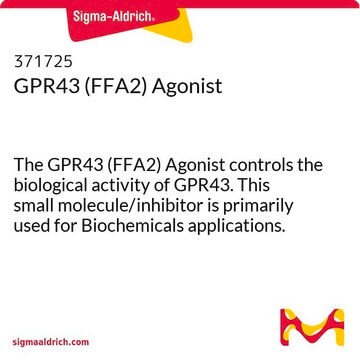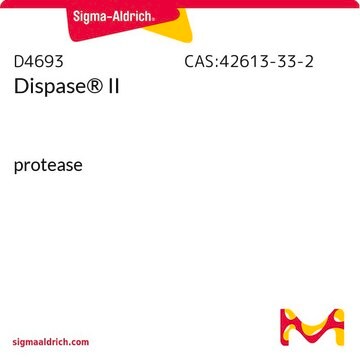SML2924
AZ1729
≥98% (HPLC)
Synonym(s):
AZ 1729, N-[3-(2-carbamimidamido-4-methyl-1,3-thiazol-5-yl)phenyl]-4-fluorobenzamide
Sign Into View Organizational & Contract Pricing
All Photos(1)
About This Item
Empirical Formula (Hill Notation):
C18H16FN5OS
CAS Number:
Molecular Weight:
369.42
UNSPSC Code:
12352200
NACRES:
NA.77
Recommended Products
Quality Level
Assay
≥98% (HPLC)
form
powder
color
white to beige
solubility
DMSO: 2 mg/mL, clear
storage temp.
−20°C
Biochem/physiol Actions
AZ1729 is a short chain fatty acid receptor FFA2 (GPR43) regulator that acts as a direct allosteric agonist and as a positive allosteric modulator (PAM). AZ1729 selectively enhances Gi-mediated signaling (Gi-biased ligand), but not at those transduced by Gq/G11 pathway.
Storage Class Code
11 - Combustible Solids
WGK
WGK 3
Flash Point(F)
Not applicable
Flash Point(C)
Not applicable
Certificates of Analysis (COA)
Search for Certificates of Analysis (COA) by entering the products Lot/Batch Number. Lot and Batch Numbers can be found on a product’s label following the words ‘Lot’ or ‘Batch’.
Already Own This Product?
Find documentation for the products that you have recently purchased in the Document Library.
Daniele Bolognini et al.
The Journal of biological chemistry, 291(36), 18915-18931 (2016-07-08)
The short chain fatty acid receptor FFA2 is able to stimulate signaling via both Gi- and Gq/G11-promoted pathways. These pathways are believed to control distinct physiological end points but FFA2 receptor ligands appropriate to test this hypothesis have been lacking.
Simon Lind et al.
Biochimica et biophysica acta. Molecular cell research, 1867(6), 118689-118689 (2020-02-25)
The non-activating allosteric modulator AZ1729, specific for free fatty acid receptor 2 (FFAR2), transfers the orthosteric FFAR2 agonists propionate and the P2Y2R specific agonist ATP into activating ligands that trigger an assembly of the neutrophil superoxide generating NADPH-oxidase. The homologous
Eugenia Sergeev et al.
Scientific reports, 7(1), 13741-13741 (2017-10-25)
Free Fatty Acid Receptor 2 is a GPCR activated by short chain fatty acids produced in high levels in the lower gut by microbial fermentation of non-digestible carbohydrates. A major challenge in studying this receptor is that the mouse ortholog
Our team of scientists has experience in all areas of research including Life Science, Material Science, Chemical Synthesis, Chromatography, Analytical and many others.
Contact Technical Service








